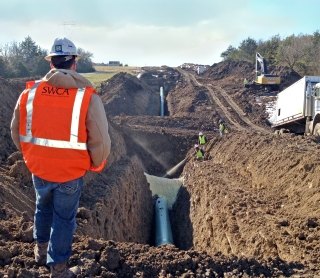Navigating ever-changing oil and gas regulations can be a challenge, but there are things you can do to help your project succeed.
We asked our FERC Program Director Scott Urwick to talk about the FERC process and best practices. Scott has more than 30 years of experience in environmental consulting with a specialized focus on large-scale natural gas projects regulated by FERC. He has experience negotiating the FERC process in unusually short timeframes on natural gas pipeline projects. He also helped develop the first-ever FERC Guidance Manual on Environmental Report Preparation in 1995.
First of all, for those of us who don’t know – what is FERC and why is it important?
Scott: FERC stands for the Federal Energy Regulatory Commission, and it is an independent government agency, officially organized as part of the Department of Energy. FERC regulates the interstate transmission of natural gas, oil, and electricity, including review and approval of hydroelectric and natural gas projects. For these projects, FERC is responsible for determining the public convenience and necessity, as well as complying with the National Environmental Policy Act (NEPA).
What’s the first thing you tell clients who have FERC requirements to meet?
Scott: Address constructability early. It is much better to ensure the project is constructible early in the design and review process, rather than relying on FERC’s post-certificate variance process. And communication is key. Keep your FERC project manager in the loop at every stage, including project issues and proposed solutions.
Can you tell us a bit about the filing process?
Scott: FERC has a traditional filing process, in which an applicant files an application and FERC staff conducts its review, including environmental, prior to making a decision whether to approve the project. FERC also has a pre-filing process, in which FERC can begin to review the project and commence the NEPA review prior to the applicant officially filing its application. This pre-filing process is mandatory for liquefied natural gas (LNG) projects and optional for natural gas pipeline and compression projects. Regardless of which process you use, you want to be sure to address all filing requirements instead of relying solely on FERC’s stated minimum filing requirements. If there are filing requirements that do not apply to your project, provide an explanation in your report. The same thing applies to requirements that have not been addressed; provide a reason and a schedule for addressing and filing information with FERC.
How do you handle potential issues that may arise with a FERC project?
Scott: I use a process: identify, track, assign, resolve. The process is important to ensure that nothing is overlooked. As issues are identified by you or any applicable agencies, add them to a tracking list and assign them to the appropriate project team member for resolution. Tracking will ensure that no issues are forgotten and that all are appropriately addressed in the FERC environmental report. Throughout the process, maintain thorough and accurate documentation, including identified issues and resolutions, agency communications, and communications with other affected stakeholders.
What other advice do you have for developing a FERC environmental report?
Scott: Be accurate and consistent. This applies to project dimensions, construction and operational land requirements, and quantified impacts on environmental resources. Part of your process should include performing checks to ensure that the information among the various resource reports and environmental permit applications is consistent. I also recommend practicing diligence with all permitting requirements and agency clearances. It can help to make checklists of agency permitting requirements to make sure they are addressed, and then include that permitting information in the report as appropriate.
Do you have any advice for dealing with the many agencies involved in a complex FERC-regulated project?
Scott: It may sound simple, but developing and preserving relationships. Your reputation with agencies and other stakeholders is critical. It’s helpful to have an understanding of the various agency requirements going into the project. Additionally, providing complete and accurate responses to data requests – issued by FERC and other permitting agencies – allows the agencies to efficiently proceed with their required environmental reviews.
Any parting words?
Scott: Things are always evolving or changing. When setting out to permit a project, always consult with the agencies for the latest guidance. Your project will benefit from knowing what the agencies are expecting to see.
For more information about our FERC services, CONTACT US.
